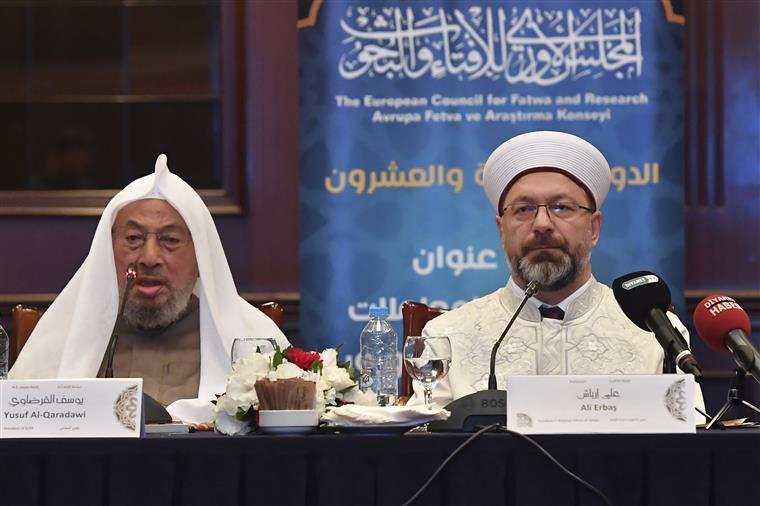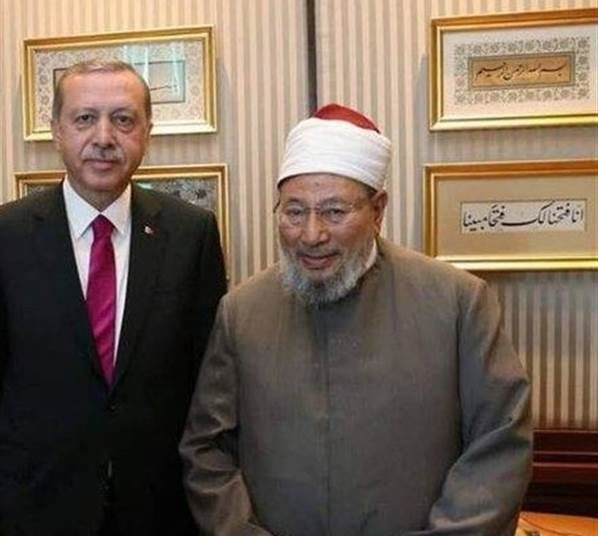Levent Kenez/Stockholm
One couldn’t help but wonder how Turkish President Recep Tayyip Erdoğan would react to the death of cleric Yusuf al-Qaradawi, the spiritual leader of the Muslim Brotherhood, due to the fact that al-Qaradawi, who was close to Erdoğan, was also blacklisted by Saudi Arabia, Egypt and the United Arab Emirates, all of whose relations with Turkey are starting to improve.
While Erdoğan did not post any condolences on his social media accounts, contrary to what he usually does, his office said Erdoğan called al-Qaradawi’s son Abdul Rahman Yusuf to express condolences and also that a commemoration meeting would be held in İstanbul next week. Erdoğan, who wanted to be both cautious and respectful at the same time, sent Ali Erbaş, the top government imam who leads the Directorate of Religious Affairs (Diyanet), to the funeral in Doha on Tuesday, ensuring that Turkey was represented by a state official.

Known for his strong support for Erdoğan, al-Qaradawi had attended many events in Turkey and thanked the Erdoğan government for leading the world’s Muslims. Saying, “If we keep Turkey alive, we will be able to sustain ourselves as Muslims,” al-Qaradawi described Erdoğan as a hope for the Islamic world.
Erbaş prayed during al-Qaradawi’s burial:
At an event he attended in Turkey in 2016, al-Qaradawi had said, “Turkey offers unlimited blessings and services to refugees fleeing the war in Syria,” adding, “Turkey carries our honor and dignity. Turkey is the most glorious country in the history of Islam. Turkey is one of the rare countries that has been a servant of Islam throughout history. If an oppressed [person] needs help, Turkey has always stood by him.”
Pro-Erdoğan cleric al-Qaradawi was the founder of the International Union of Muslim Scholars (IUMS), a Muslim Brotherhood-linked organization funded by Qatar. He endorsed suicide bombings and armed rebellion in Syria. IUMS, listed as a terrorist group by Saudi Arabia, the UAE, Egypt and Bahrain, has been branching out in Turkey with the generous support of the Erdoğan government.
Al-Qaradawi, who was accused of terrorism by the Gulf countries and Egypt for his support of the Muslim Brotherhood, sided with Qatar in the crisis between Qatar and the other Gulf countries in 2017. While al-Qaradawi’s death received minimal coverage in the Egyptian press, it was reported in the Arab media that it was forbidden to perform funeral prayers for him.
Erbaş, who attend the funeral in Doha, called al-Qaradawi one of the most respected scholars of the Islamic world.
“The late Yusuf al-Qaradawi, one of the [lights] of our time, will be remembered with gratitude for generations as a distinguished scholar who devoted his life to understanding and living the provisions, principles and values of Islam, who fought for the defense of the ummah and inspired Muslims with his righteous stance,” Erbaş said in his condolence message before his departure for Doha.
Erbaş participated in a live broadcast on Al Jazeera in Doha and stated that al-Qaradawi spent his life serving Islam. Speaking in Turkish during the broadcast, Professor Erbaş was harshly criticized by Turkish social media users who posted messages saying it was fatal incompetence for the head of the Diyanet to fail to express himself in Arabic, the language of the Quran and the fundamental sources of Islamic studies.












